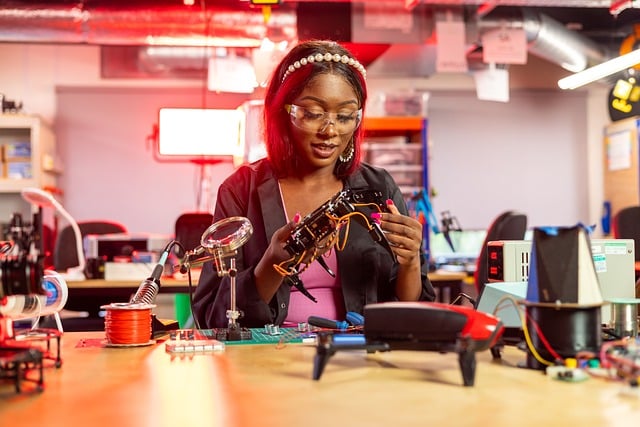# The Evolution of AI Technology: How Intelligent Systems are Reshaping Our World Today
The rapid advancement of artificial intelligence (AI) technology has transformed numerous aspects of our daily lives, from the way we communicate to how we work and make decisions. As AI systems evolve, they are becoming increasingly sophisticated, capable of performing tasks that were once thought to be exclusive to human intelligence. This article explores the evolution of AI technology, examining its historical context, current applications, and future implications.
## Historical Context: From Concept to Reality
Initially, the concept of artificial intelligence emerged in the mid-20th century, with pioneers like Alan Turing and John McCarthy laying the groundwork for what would become a revolutionary field. Turing’s seminal paper, “Computing Machinery and Intelligence,” proposed the idea of machines that could simulate human intelligence. This foundational thinking led to the development of early AI programs, such as the Logic Theorist and ELIZA, which demonstrated the potential for computers to engage in simple reasoning and conversation.
As the decades progressed, AI technology experienced periods of both optimism and stagnation, often referred to as “AI winters.” During these downturns, funding and interest dwindled due to unmet expectations regarding AI capabilities. However, the resurgence of interest in the 21st century can be attributed to several factors, including the exponential growth of computational power, the availability of vast datasets, and the development of advanced algorithms, particularly in machine learning and deep learning. These advancements have propelled AI from theoretical discussions to practical applications that permeate various industries.
Notably, the introduction of neural networks marked a significant turning point in AI development. Inspired by the human brain’s architecture, neural networks enabled machines to learn from data in a manner similar to human cognitive processes. This innovation has led to breakthroughs in image and speech recognition, natural language processing, and autonomous systems. Consequently, AI has transitioned from a niche research area to a central component of modern technology.
## Current Applications: AI in Everyday Life
Artificial intelligence is now woven into the fabric of our everyday lives, influencing how we interact with technology and each other. One of the most prominent applications of AI is in personal assistants like Siri, Alexa, and Google Assistant. These systems utilize natural language processing to understand and respond to user queries, making everyday tasks more efficient. By leveraging AI, these virtual assistants can schedule appointments, control smart home devices, and provide real-time information, thereby enhancing user convenience.
Moreover, the healthcare sector has witnessed a remarkable transformation due to AI integration. Intelligent systems are now being employed for predictive analytics, diagnostic assistance, and personalized treatment plans. For instance, AI algorithms can analyze medical images with a level of accuracy that rivals human radiologists, enabling earlier detection of conditions such as cancer. Additionally, AI-driven predictive models can assess patient data to anticipate potential health risks, allowing for proactive interventions and improved patient outcomes.
In the realm of business, AI is revolutionizing decision-making processes. Companies are harnessing data analytics powered by AI to gain insights into consumer behavior, optimize supply chains, and enhance marketing strategies. Predictive analytics tools can forecast market trends, enabling organizations to make informed decisions that drive growth and efficiency. Furthermore, AI chatbots are enhancing customer service experiences by providing instant support and resolving inquiries without human intervention.
## Future Implications: Challenges and Opportunities
As AI technology continues to evolve, it brings forth both opportunities and challenges that society must navigate. Ethical considerations surrounding AI deployment are increasingly coming to the forefront. Concerns regarding data privacy, algorithmic bias, and the potential for job displacement necessitate a thoughtful approach to AI governance. Policymakers, technologists, and ethicists must collaborate to establish frameworks that ensure responsible AI development and deployment.
Furthermore, the prospect of autonomous systems, such as self-driving cars and drones, presents a unique set of challenges. While these technologies have the potential to enhance safety and efficiency, they also raise questions about regulatory frameworks, liability, and the impact on employment in traditional driving professions. Addressing these concerns will require interdisciplinary collaboration and innovative policy solutions to ensure that the benefits of AI are maximized while minimizing risks.
On the other hand, the future of AI holds immense promise for innovation and societal advancement. As intelligent systems become more integrated into various sectors, new opportunities for economic growth and improved quality of life will emerge. Fields such as education, agriculture, and environmental sustainability stand to benefit significantly from AI applications. For example, AI-driven personalized learning platforms can adapt to individual student needs, fostering better educational outcomes. Similarly, AI can optimize agricultural practices, enhancing food security and sustainability.
In conclusion, the evolution of AI technology has reshaped our world in profound ways. From its historical roots to its current applications and future implications, AI continues to demonstrate its transformative potential. As we navigate the complexities of this technological evolution, it is essential to embrace the opportunities while addressing the challenges that arise. By fostering a collaborative and ethical approach to AI development, society can harness the power of intelligent systems to create a better, more equitable future for all.











